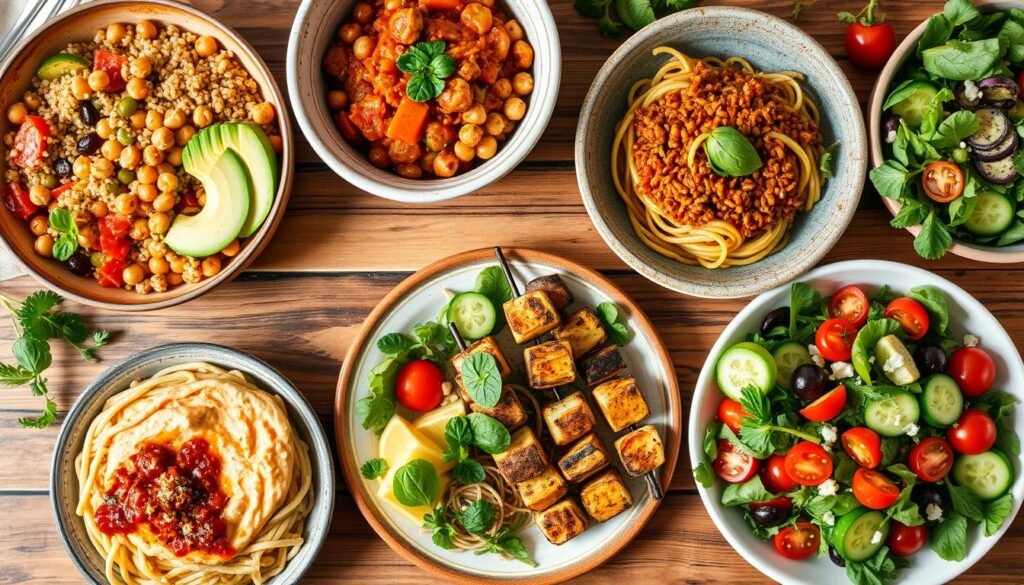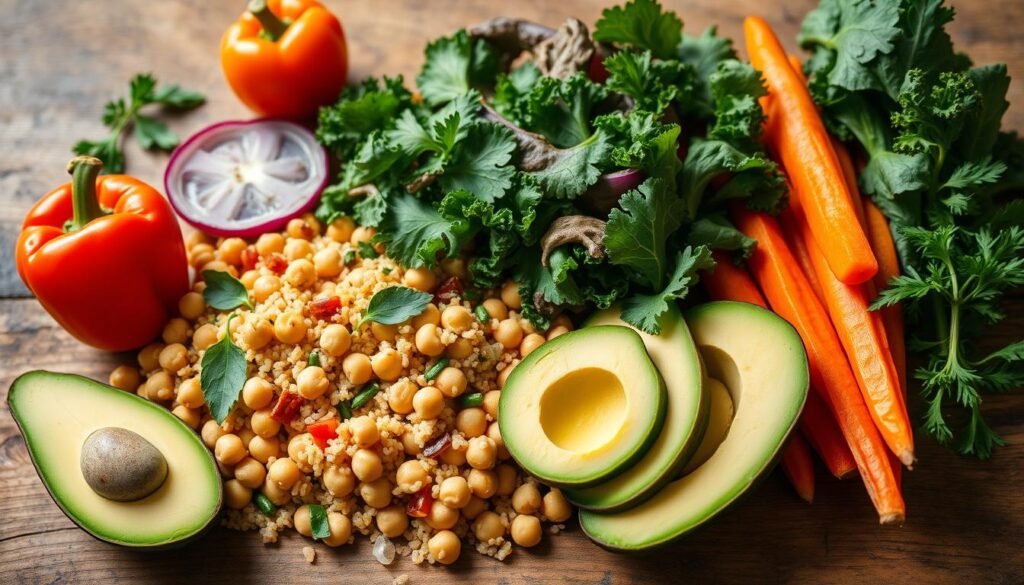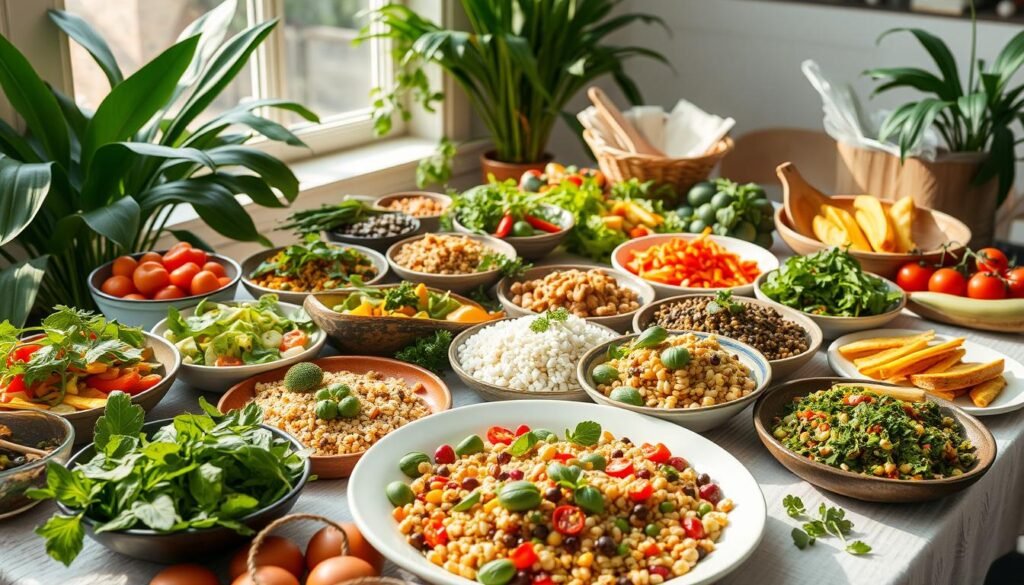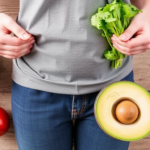Exploring plant-based meal plans changed how I see food and health. I used to feel tired and eat poorly. But finding a vegetarian lifestyle helped me regain my energy and health.
Plant-based meals are more than just food. They are a way to care for your body. Each meal has over 15 grams of protein from plants. Plus, you can make these tasty dishes in just 25 minutes.
This guide will show you how to make healthy, tasty plant-based meals. You’ll learn about quick meals for weekdays and batch cooking for the weekend. It’s easy and fun to eat well.
Key Takeaways
- Plant-based diets offer nutrient-dense meals with high protein content
- Most recipes can be prepared in under 30 minutes
- Switching to plant-based meals can improve overall health and energy
- Meal preparation can be simple and time-efficient
- Plant-based eating supports sustainable weight management
Understanding Plant-Based Nutrition Fundamentals
Plant-based nutrition significantly improves your health. It’s becoming more popular as people see the benefits of eating whole foods. This approach can greatly improve your well-being.
Essential Nutrients in Plant-Based Foods
Plant-based diets are packed with nutrients that keep you healthy. You can get all the nutrients your body needs from plant-based meals. These meals include:
- Complete protein sources from legumes and grains
- Vital minerals like iron, calcium, and zinc
- Powerful antioxidants that fight off cellular damage
“Food is the most powerful medicine we can use to prevent and treat many chronic diseases.” – Dr. Michael Greger
Benefits of Switching to Plant-Based Eating
Switching to anti-inflammatory foods can change your health for the better. Studies show that plant-based diets can:
- Reduce heart disease risk by up to 25%
- Lower type 2 diabetes risk
- Help with sustainable weight management
Common Misconceptions About Plant-Based Diets
Many think plant-based diets lack nutrients, but strategic meal planning can solve this. With more people cutting down on meat, plant-based eating is gaining traction.
| Nutrient | Plant-Based Sources |
|---|---|
| Protein | Beans, Lentils, Tofu, Quinoa |
| Iron | Spinach, Fortified Cereals, Pumpkin Seeds |
| Calcium | Kale, Fortified Plant Milk, Almonds |
Learning about these nutrition basics lets you confidently start a plant-based lifestyle. It’s a way to nourish your body and support your health for years to come.
Weekly Meal Planning Guide for Beginners
Creating a meal plan can change how you think about food and save time. It’s easy to plan meals for your family. With the right tools, you can make healthy meals that are good for you and easy to make.
Shopping List Essentials
Start your meal planning with a smart shopping list. Here are the main things to buy:
- Proteins: Lentils, tofu, tempeh, beans
- Whole grains: Quinoa, brown rice, oats
- Fresh produce: Leafy greens, seasonal vegetables
- Healthy fats: Nuts, seeds, avocados
Meal Prep Strategies
Good meal planning means being smart about prep. Batch cooking can save a lot of time on busy days. Here are some tips:
- Cook grains and legumes in large batches
- Chop vegetables in advance
- Store prepared ingredients in clear containers
“Preparation is the secret ingredient to successful meal planning” – Nutrition Expert
Storage and Portioning Tips
Right storage keeps your meals fresh and tasty. Use airtight containers and follow these tips:
- Refrigerate prepared meals within 2 hours
- Store different food groups separately
- Label containers with preparation dates
Using these tips, you’ll make healthy, varied plant-based meals. They’ll help you reach your health goals and make cooking easier every day.
High-Protein Plant-Based Breakfast Options
Start your day with tasty, high-protein plant sources that boost energy and satisfaction. Vegan recipes can make your breakfast routine exciting, providing meals full of essential proteins and flavors.
“Breakfast is the most important meal of the day, when it’s protein-rich and plant-powered!” – Nutrition Experts
Explore high-protein recipes that show plant-based breakfasts can be both tasty and nutritious. These meals will keep you full and focused all day long.
Top High-Protein Breakfast Ideas
- Tofu Scramble with Vegetables
- Chia Seed Overnight Oats
- Protein Smoothie Bowls
- Whole Grain Toast with Almond Butter
- Quinoa Breakfast Porridge
| Breakfast Option | Protein Content | Preparation Time |
|---|---|---|
| Tofu Scramble | 15 g protein | 15 minutes |
| Chia Seed Overnight Oats | 12 g protein | 5 minutes prep + overnight |
| Quinoa Breakfast Porridge | 16 g protein | 20 minutes |
Each of these high-protein plant sources brings unique nutritional benefits. Try different ingredients to discover your favorite vegan breakfasts that nourish your body and please your taste buds.
Plant-based breakfasts can be as protein-rich as traditional ones. With a little creativity and the right ingredients, you’ll never crave animal proteins again!
Nutritious Lunch and Dinner Combinations
Exploring plant-based foods opens up a world of tasty options for lunch and dinner. Veganism is not just about cutting out certain foods. It’s about making meals that are both healthy and delicious.

Quick Weekday Meals
Busy people can enjoy quick, healthy meals. You can either use diet meal delivery services or cook fast at home. Here are some quick ideas:
- Grain bowls with roasted vegetables and legumes
- 15-minute chickpea and quinoa salads
- Spinach and artichoke creamy pasta
- Stuffed sweet potatoes with black beans
Weekend Batch Cooking Ideas
Batch cooking saves time and ensures healthy meals all week. Here are some efficient cooking ideas:
| Recipe | Prep Time | Protein Content |
|---|---|---|
| Soy-Lime Roasted Tofu | 20 minutes | 19 grams per serving |
| Red Lentil Soup | 25 minutes | 15 grams per serving |
| Cauliflower Rice Bowl | 15 minutes | 12 grams per serving |
Family-Friendly Plant-Based Dishes
Make traditional dishes healthier for your family. Creativity is key when introducing nutrient-dense foods to family meals.
“Eating plant-based doesn’t mean sacrificing flavor—it means discovering new culinary adventures!” – Nutrition Expert
- Bean patties with lower saturated fat
- Vegetable and lentil soups
- Plant-based chili alternatives
- Stir-fries packed with colorful vegetables
Smart Snacking on a Plant-Based Diet
Snacking is a smart way to keep your energy up and stick to a plant-based diet. Picking the right snacks helps you feel full between meals. They also give you important nutrients.
What you snack on matters a lot for your nutrition. Most people don’t get enough fiber, making smart snacking even more important.
“Snacks are not just fillers, but opportunities for nutrient-dense fuel,” nutrition experts suggest.
Top Plant-Based Snack Strategies
- High-protein snacks like edamame (17 g protein per cup) provide sustained energy
- Quinoa-based snacks offer approximately 8 grams of protein per serving
- Incorporate sugar alternatives such as fresh fruits for natural sweetness
- Focus on hydrating foods like cucumber, watermelon, and herbal teas
Here are some healthy snack ideas that help you reach your health goals:
- Chia seed pudding with berries
- Hummus with vegetable sticks
- Homemade energy balls with nuts and dates
- Roasted chickpeas with spices
Remember, portion control is important. Go for snacks that are 100-200 calories. They should have protein, fiber, and healthy fats to keep you full and energized all day.
Creating Balanced Plant-Based Plates
Making a complete plant-based meal is like creating art. It’s about mixing colors and nutrients. Your plate should be full of life and taste great.

Portion Control Guidelines
Knowing how much to eat is key. A good plant-based plate has:
- 1/2 plate: Colorful veggies and fruits
- 1/4 plate: Whole grains
- 1/4 plate: Plant-based proteins
Color and Nutrient Balance
Use the rainbow approach for meals. Each color brings different health benefits:
| Color | Nutrients | Example Foods |
|---|---|---|
| Red | Lycopene, Antioxidants | Tomatoes, Red Peppers |
| Green | Chlorophyll, Fiber | Spinach, Kale, Broccoli |
| Purple | Anthocyanins | Blueberries, Eggplant |
Seasonal Meal Planning
Plan meals with seasonal foods for better taste and health. Summer has fresh veggies, while winter has warm root veggies.
“Eat the rainbow and nourish your body with nature’s most powerful foods.”
Focus on balanced meals and colorful foods. This way, you’ll make healthy, tasty, plant-based dishes that help you stay well.
Plant-Based Meal Delivery Services and Resources
Switching to a plant-based diet can be tough, mainly for those with busy lives. Diet meal delivery services have become a big help. They take away the hassle of planning and cooking meals, making it simpler to eat healthy.
Top meal delivery services offer a wide range of plant-based meals:
- Factor: Provides 6-18 organic meals weekly
- Green Chef: Offers meals starting at $6.00 per serving
- Blue Apron: Features a Wellness Plan with responsibly sourced ingredients
- Home Chef: Provides over 35 unique recipes weekly
When picking a diet meal delivery service, think about these important points:
| Service | Meal Range | Price per Serving | Dietary Options |
|---|---|---|---|
| Factor | 6-18 meals/week | $11-$15 | Vegetarian, Keto, Paleo |
| Green Chef | Up to 4 meals/week | $11.99-$13.49 | Plant-based, Gluten-free |
| Blue Apron | 2-5 meals/week | $4.00-$10.00 | Wellness Plan, Vegetarian |
Many services now offer free nutrition consultations. These can help you pick the right meals for your plant-based diet and health goals.
“Meal delivery services are changing how people eat healthy, making it easier than ever.”
Other resources to help you on your plant-based path include nutrition apps, online groups, and cookbooks. These tools can make your switch to a plant-based diet easier and more fun.
Addressing Nutritional Concerns in Plant-Based Diets
When you follow a vegetarian diet, you need to plan carefully to get all the nutrients you need. Plant-based diets are great for your health, but it’s important to know where you might be missing out.
Some nutrients are more important to pay attention to in plant-based diets:
- Vitamin B12
- Iron
- Zinc
- Omega-3 fatty acids
- Calcium
“A well-planned plant-based diet can provide all necessary nutrients for optimal health.” – Nutrition Experts
Focus on eating a variety of foods and consider supplements if needed. Different plant-based foods can help you get the nutrients you need.
| Nutrient | Plant-Based Sources | Recommended Daily Intake |
|---|---|---|
| Vitamin B12 | Fortified plant milk, nutritional yeast | 2.4 mcg |
| Iron | Lentils, spinach, tofu | 8-18 mg |
| Zinc | Beans, nuts, whole grains | 8-11 mg |
| Omega-3 | Chia seeds, walnuts, flaxseeds | 1.1-1.6 g |
Some people might need supplements. Consulting a registered dietitian can help personalize your nutritional approach. Regular blood tests can show if you’re missing any nutrients and help you make better food choices.
It’s not just about what you eat, but how your body absorbs it. Eating iron-rich foods with vitamin C can help your body use these nutrients better. With the right choices and mindful eating, your plant-based diet can be complete.
Conclusion
Exploring healthy eating through plant-based diets is more than just a choice. It’s a lifestyle change. With vegans in America growing by 500% from 2014 to 2017, you’re part of a big movement. This movement focuses on health and caring for the planet.
Plant-based proteins are a great alternative to meat. They offer many health benefits. Studies show they can help with weight, blood pressure, and heart health. This shift towards plants shows we’re learning about how food affects us and the planet.
You don’t have to be perfect to start. Just make small, mindful choices. Try more plant-based meals and listen to what your body needs. Even small changes can make a big difference.
Every meal is a chance to nourish yourself and help the planet. It’s a journey of discovery. Be kind to yourself, and celebrate the good you’re doing with every healthy meal.




